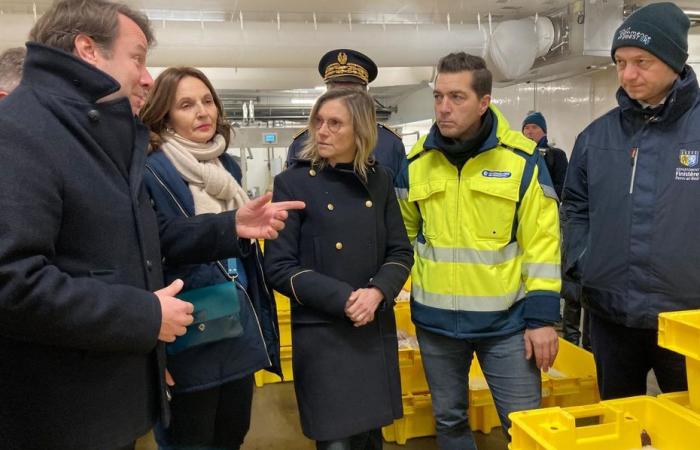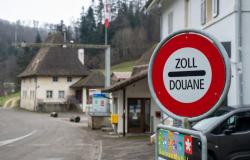
Agnès Pannier-Runacher announced, this Friday at Guilvinec in Finistère, to put “20 million euros on the table” to compensate for the closure of the Bay of Biscay. Drop in tonnages, Brexit rules, the Minister of Fisheries tried to reassure the fishermen of Finistère.
The essentials of the day: our exclusive selection
Every day, our editorial team reserves the best regional news for you. A selection just for you, to stay in touch with your regions.
France Télévisions uses your email address to send you the newsletter “Today’s essentials: our exclusive selection”. You can unsubscribe at any time via the link at the bottom of this newsletter. Our privacy policy
It was 5:30 this morning when the Minister of Fisheries arrived in the port of Guilvinec. Agnès Pannier-Runacher comes to meet the players in a sector in crisis: Brexit, fleet exit plan, end of fuel aid, upcoming ban on fishing in the Bay of Biscay… There are many sources of concern. Moreover, he is quickly reminded of key figures. “Last year, to give you an idea, we reduced turnover by around ten percent. And there, we are starting the year on a basis of minus 20% because we seriously lacking in fish!” alert to the passage of the minister, Guénolé Merveilleux, the president of the Océalliance fish trading group.
The fish market of this Finistère port is a stronghold of Cornish fishing. A fishery which in 2024 fell below the 10,000 tonnes of fish mark. This is half as much as ten years ago. The fault in particular is Brexit, which has reduced the scope of work for the entire sector and forced the players to have an ecologically and financially different organization: “The aberration of our system is that rather than buying our fish with boats from here, we went to buy our fish in Denmark, Norway, Iceland…” continues Guénolé Merveilleux.
As a result, several companies are on hold. And it is not the closure of fishing in the Bay of Biscay between January 22 and February 20 that reassures them… More than 300 vessels on the Atlantic coast (of the 450 French vessels) are concerned.
The Minister responsible for Ecological Transition, Biodiversity, Forests, Sea and Fisheries, Agnès Pannier-Runacher tries to reassure. She says she is doing everything possible to lift the ban in 2027. Until then, the State, she assures, will compensate “losses”. And the minister to commit “to put 20 million euros on the table, that is to say an envelope slightly higher than last year”to help fishermen whose boats will remain at the dock.
338 vessels (boats over eight meters) will be affected by this new closure of fishing in the Bay of Biscay between January 22 and February 20. This is the second year that the measure will apply to protect cetaceans, which the Minister of Fisheries defends.
In addition to fishing, we must not forget that the Minister is also in charge of the Ecological Transition, Biodiversity and the Sea: “It’s a protective measure, she declares. And we could see last year that it was working since we recorded a division by four in the number of deaths of dolphins and other cetaceans. That means it’s working.”
Read also: Dolphins: fatal catches divided by four during the month without fishing in the Bay of Biscay
But the Minister does not say “satisfied to have to compensate and prevent the boats from working.” She asked her teams “to accelerate the implementation of measures which make it possible to reconcile fishing and the protection of cetaceans”with “scarers”.
-“We have a task force which is at work, which has already met twice this week to look at how we install these devices, how we support them, how we gather with scientists the data which will make it possible to demonstrate that the “we can actually continue fishing while significantly reducing the impact on cetaceans”describes the minister.
Read also: Accidental captures of dolphins: fishermen make proposals, “there must still be both dolphins and fishermen”
Within two years, its objective is to “allow the reopening of fishing in the Bay of Biscay for boats over eight meters”, in 2027. Until then she wants to see if “from 2026, we can demonstrate that, for example, equipped vessels are capable of keeping cetaceans away and therefore being able to fish”.
duration of video: 00h00mn23s
Traveling to Guilvinec on Friday January 17, 2025, the Minister of Fisheries and Ecological Transition, Agnès Pannier-Runacher, tried to reconcile fishing and protection of cetaceans.
•
©FTR
But the minister repeats that it is necessary “scientific data requires results, and that is why it is important to work very closely with fishing professionals and that is my commitment”.
A few hours before his arrival, the president of the Regional Council of Brittany (present this Friday alongside the Minister) made a point of reminding us that “if the preservation of cetaceans is an essential issue, it must be linked to a balanced vision of maritime activities.” Loïg Chesnais-Girard insisted: “In a context where we import 70% of our fish, we must integrate this ecological imperative into a global strategy of food sovereignty and solidarity with our seafood workers.”
The ban, taken by the European Commission and motivated by the desire to limit accidental captures of dolphins and porpoises, will, according to him, have “very serious consequences for fishermen, fishmongers, fish auctions, already weakened by multiple crises: Brexit, reduction of quotas, increase in the price of diesel, regulatory tightening, inflation… It affects a vital sector for economic activity in Brittany , and for food sovereignty in Europe.”
The day before this ministerial visit to Finistère lands, David Le Quintrec, the president of the UFPA (French Union of Artisan Fishermen) announced to him on Thursday, January 16, that he had filed an interim appeal before the Council of State against a ministerial decree which requires 115 vessels to be equipped with on-board cameras by October 30, 2025. Objective: reduce accidental captures of dolphins. “These cameras, once installed, will be used to target fishermen. They will be at your expense” regretted David Le Quintrec, who recalled that “the protection of populations of small cetaceans in French waters and particularly in the Bay of Biscay, is a recurring problem for artisanal fishing suspected of being responsible for mortality of anthropogenic origin through accidental captures in the fishing nets.” He contests the basis and methodology of this new decree.
(With AFP, Claire Louet and Stéphane Soviller)





